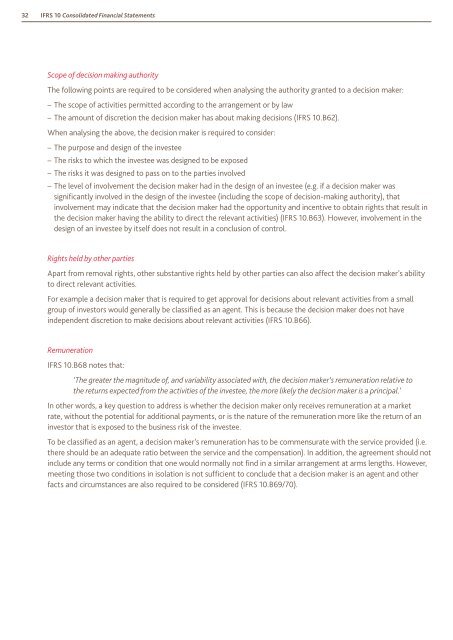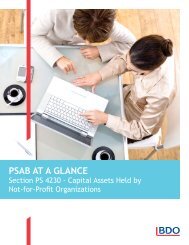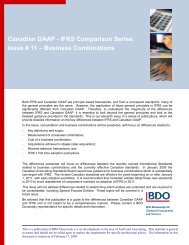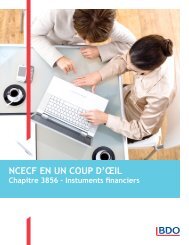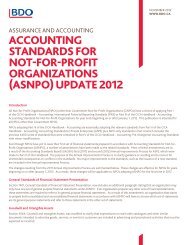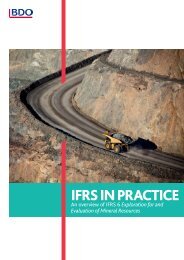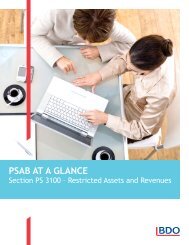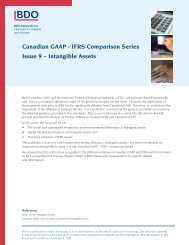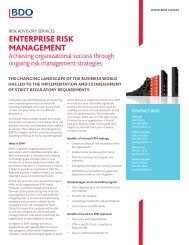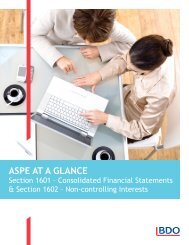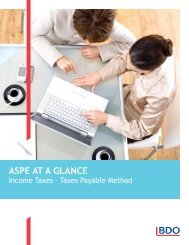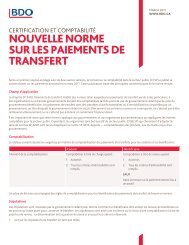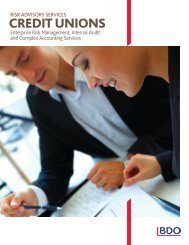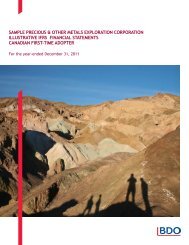Need to Know: IFRS 10 - Consolidated Financial ... - BDO Canada
Need to Know: IFRS 10 - Consolidated Financial ... - BDO Canada
Need to Know: IFRS 10 - Consolidated Financial ... - BDO Canada
- No tags were found...
Create successful ePaper yourself
Turn your PDF publications into a flip-book with our unique Google optimized e-Paper software.
32 <strong>IFRS</strong> <strong>10</strong> <strong>Consolidated</strong> <strong>Financial</strong> StatementsScope of decision making authorityThe following points are required <strong>to</strong> be considered when analysing the authority granted <strong>to</strong> a decision maker:––The scope of activities permitted according <strong>to</strong> the arrangement or by law––The amount of discretion the decision maker has about making decisions (<strong>IFRS</strong> <strong>10</strong>.B62).When analysing the above, the decision maker is required <strong>to</strong> consider:––The purpose and design of the investee––The risks <strong>to</strong> which the investee was designed <strong>to</strong> be exposed––The risks it was designed <strong>to</strong> pass on <strong>to</strong> the parties involved––The level of involvement the decision maker had in the design of an investee (e.g. if a decision maker wassignificantly involved in the design of the investee (including the scope of decision-making authority), thatinvolvement may indicate that the decision maker had the opportunity and incentive <strong>to</strong> obtain rights that result inthe decision maker having the ability <strong>to</strong> direct the relevant activities) (<strong>IFRS</strong> <strong>10</strong>.B63). However, involvement in thedesign of an investee by itself does not result in a conclusion of control.Rights held by other partiesApart from removal rights, other substantive rights held by other parties can also affect the decision maker’s ability<strong>to</strong> direct relevant activities.For example a decision maker that is required <strong>to</strong> get approval for decisions about relevant activities from a smallgroup of inves<strong>to</strong>rs would generally be classified as an agent. This is because the decision maker does not haveindependent discretion <strong>to</strong> make decisions about relevant activities (<strong>IFRS</strong> <strong>10</strong>.B66).Remuneration<strong>IFRS</strong> <strong>10</strong>.B68 notes that:‘The greater the magnitude of, and variability associated with, the decision maker’s remuneration relative <strong>to</strong>the returns expected from the activities of the investee, the more likely the decision maker is a principal.’In other words, a key question <strong>to</strong> address is whether the decision maker only receives remuneration at a marketrate, without the potential for additional payments, or is the nature of the remuneration more like the return of aninves<strong>to</strong>r that is exposed <strong>to</strong> the business risk of the investee.To be classified as an agent, a decision maker’s remuneration has <strong>to</strong> be commensurate with the service provided (i.e.there should be an adequate ratio between the service and the compensation). In addition, the agreement should notinclude any terms or condition that one would normally not find in a similar arrangement at arms lengths. However,meeting those two conditions in isolation is not sufficient <strong>to</strong> conclude that a decision maker is an agent and otherfacts and circumstances are also required <strong>to</strong> be considered (<strong>IFRS</strong> <strong>10</strong>.B69/70).


